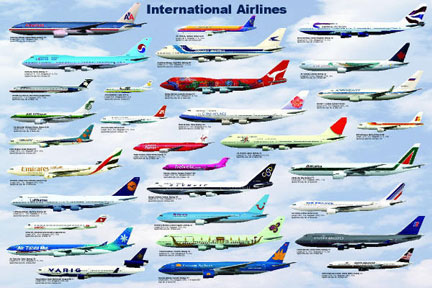Airline passenger demand to rise 31%
Geneva: The International Air Transport Association (IATA) released
the IATA Airline Industry Forecast 2013-2017 showing that airlines
expect to see a 31% increase in passenger numbers between 2012 and 2017.
By 2017 total passenger numbers are expected to rise to 3.91 billion -
an increase of 930 million passengers over the 2.98 billion carried in
2012.
 The IATA Airline Industry Forecast 2013-2017 is a consensus outlook
for system-wide passenger growth. Demand is expected to expand by an
average of 5.4% compound annual growth rate (CAGR) between 2013 and
2017. By comparison, global passenger growth expanded by 4.3% CAGR
between 2008 and 2012, largely reflecting the negative impact of the
2008 global financial crisis and recession. The IATA Airline Industry Forecast 2013-2017 is a consensus outlook
for system-wide passenger growth. Demand is expected to expand by an
average of 5.4% compound annual growth rate (CAGR) between 2013 and
2017. By comparison, global passenger growth expanded by 4.3% CAGR
between 2008 and 2012, largely reflecting the negative impact of the
2008 global financial crisis and recession.
Of the new passengers, approximately 292 million will be carried on
international routes and 638 million on domestic routes. The emerging
economies of the Middle East and Asia-Pacific will see the strongest
international passenger growth with CAGR of 6.3% and 5.7%, followed by
Africa and Latin America with CAGR of 5.3% and 4.5%.
Routes within or connected to China will be the single largest driver
of growth, accounting for 30% of new passengers. Of the anticipated
227.4 million additional passengers, 195 million will be domestic and
32.4 million will be international.
The Asia-Pacific region (including China) is expected to add around
300 million additional passengers by the end of the current forecast
horizon. Of these, around 225 million or 75% are expected to be domestic
passengers.
With 677.8 million domestic passengers in 2017, the United States
will continue to be the largest single market for domestic passengers,
although it will add only 70 million passengers over the forecast period
(2.2% CAGR).
This reflects the market's maturity. China is firmly established in
second place (487.9 million passengers in 2017, 10.2% CAGR.). The US
will also reclaim the top spot from Germany for international
passengers. Germany will add 27.2 million passengers to the 149.4
million in 2012 (3.4% CAGR.), while the US will add 28.2 million
international passengers, rising from 149.3 million in 2012 to 177.5
million (3.5% CAGR) in 2017.
"The fact that the Asia-Pacific region - led by China - and the
Middle East will deliver the strongest growth over the forecast period
is not surprising.
Governments in both areas recognise the value of the connectivity
provided by aviation to drive global trade and development.
Similar opportunities exist for developing regions in Africa and
Latin America. To reap the benefit, governments in the regions need to
change their view of aviation from a luxury cash cow to a utilitarian
powerful draft horse to pull the economy forward," said IATA Director
General and CEO. Tony Tyler.
Globally, aviation supports some 57 million jobs and $2.2 trillion in
economic activity.
International passenger numbers are expected to rise by 25% from 1.2
billion in 2012 to 1.5 billion in 2017, bringing 292 million additional
passengers (4.6% CAGR).
Uzbekistan (10.3% CAGR) has displaced Kazakhstan (9.0% CAGR) as the
fastest growing market for international passenger traffic. The
remaining eight are Russia (7.7% CAGR), Turkey (7.6% CAGR), Oman (7.5%
CAGR), China (7.1% CAGR), Vietnam (6.9%CAGR), Saudi Arabia (6.9%),
Azerbaijan (6.8% CAGR), and Pakistan (6.7% CAGR).
No Latin American or African countries are among the fastest growing
markets.
United Arab Emirates will add 29.2 million passengers (6.6% CAGR)
over the forecast period, nearly as many as China. International
traffic, routes between the Middle East and Asia-Pacific will see the
strongest growth. Domestic passenger numbers are expected to rise from
1.82 billion in 2012 to 2.46 billion in 2017, an increase of 639 million
reflecting a CAGR of 6.2%.
Brazil will firmly establish itself as the third-largest domestic
market after the US and China, with 122.4 million passengers in 2017, an
increase of 32 million passengers from the 90 million 2012 (6.3% CAGR).
Turkey enters the Top 10 largest markets with 26.3 million passengers
and will add 17.2 million more (10.6% CAGR). It is also the second
fastest growing domestic market. |

